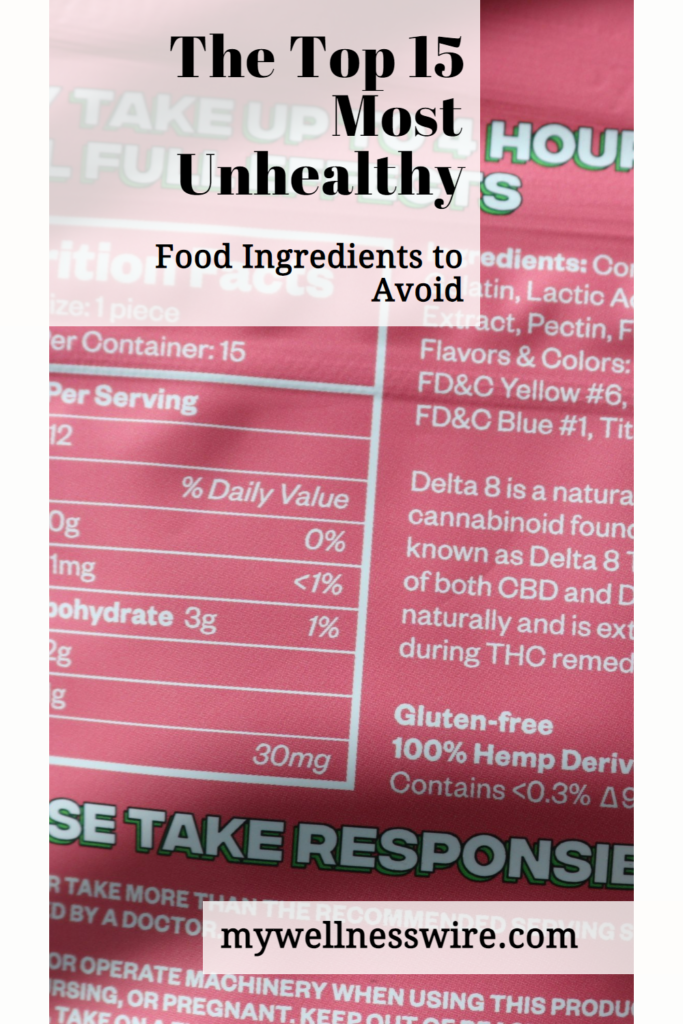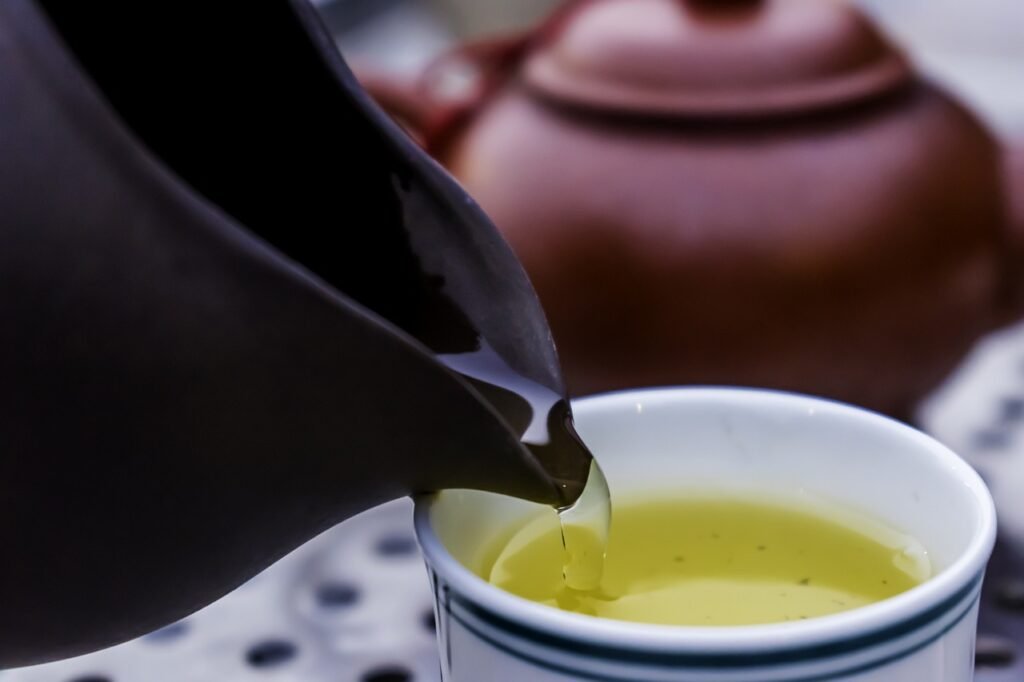
- Intro
- Most Unhealthy Food Ingredients:
- 1. Trans Fats – The Hidden Enemy in Processed Foods
- 2. High-Fructose Corn Syrup – Sweetness with a Price
- 3. Artificial Sweeteners – A Bitter Truth
- 4. Sodium Benzoate and Potassium Benzoate – Preservatives to Question
- 5. Butylated Hydroxyanisole (BHA) – Questionable Shelf Life Extender
- 6. Sodium Nitrites and Nitrates – Curing with Caution
- 7. Monosodium Glutamate (MSG) – A Flavor Enhancer to Watch
- 8. Artificial Colors – A Rainbow of Risks
- 9. Phosphates – Abundant but Troublesome
- 10. Partially Hydrogenated Oils – Trans Fats in Disguise
- 11. Artificial Flavorings – Complexity Without Clarity
- 12. Propyl Paraben – Preservative with Potential Problems
- 13. Aluminum Additives – An Unwelcome Ingredient
- 14. Potassium Bromate – A Dough Strengthener Under Scrutiny
- 15. Brominated Vegetable Oil (BVO) – A Cloudy Addition to Soft Drinks
Intro
When it comes to our diets, we often focus on eating healthy and nutritious foods. However, sometimes we overlook the harmful ingredients that lurk in many processed and packaged foods. These unhealthy food ingredients can have detrimental effects on our health, from increasing the risk of chronic diseases to negatively impacting our overall well-being. In this blog post, we will uncover the top 15 most unhealthy food ingredients to avoid, so you can make more informed choices about what you put into your body.
Most Unhealthy Food Ingredients:
1. Trans Fats – The Hidden Enemy in Processed Foods
In the world of processed and convenience foods, trans fats play a notorious role. Crafted through hydrogenation, these artificial fats sneak into our diet via fried snacks, pastries, and even some types of margarine.
Their consumption is a risk factor for elevated bad cholesterol levels, laying the groundwork for heart disease. Vigilance is key: scrutinize labels for any mention of hydrogenated oils and make a conscious effort to bypass products harboring trans fats. By doing so, you’re not just avoiding an ingredient; you’re taking a stand for your heart’s health.
2. High-Fructose Corn Syrup – Sweetness with a Price
High-fructose corn syrup has become a staple in the world of sweeteners, prominently featuring in sodas, snacks, and a multitude of processed foods. Its widespread use is concerning, given its ties to a host of health problems including obesity, type 2 diabetes, and non-alcoholic fatty liver disease.
The issue with this syrup isn’t just its ubiquity; it’s the way our bodies process it. Unlike traditional sugar, high-fructose corn syrup can overload the liver, leading to fat buildup and a cascade of metabolic disturbances. It’s a deceptive ingredient, offering the allure of sweetness, yet delivering a payload of potential health risks.
Limiting exposure to this ingredient by scrutinizing labels and choosing foods with natural sweetening alternatives can mitigate these risks, steering your diet towards a healthier trajectory.
3. Artificial Sweeteners – A Bitter Truth
In the pursuit of lower-calorie alternatives to sugar, many turn to artificial sweeteners like aspartame, saccharin, and sucralose, found in a plethora of diet beverages and sugar-free treats. Though they boast fewer calories, their health implications spark concern.
Studies have suggested a link between these sugar substitutes and an array of unsettling health outcomes, including disruptions in metabolic processes and potential gastrointestinal discomfort.
Rather than resorting to these synthetic options, consider embracing natural sweeteners such as honey or maple syrup. These provide a touch of sweetness without the controversial side effects, guiding you toward a more harmonious dietary balance.
4. Sodium Benzoate and Potassium Benzoate – Preservatives to Question
Navigating the aisles of your local supermarket, you might not immediately notice sodium benzoate and potassium benzoate on the ingredient lists of your favorite beverages and pickled goods.
These preservatives are utilized to ward off microbial growth, ensuring the longevity of products. Despite their widespread use, there’s growing evidence to suggest that they may not be as benign as once thought. Some studies indicate a potential link to increased hyperactivity in children and allergic reactions in sensitive individuals.
As we strive for optimal health, being aware of such ingredients is crucial. Making the choice to seek out alternatives without these preservatives can be a proactive step towards safeguarding your well-being, encouraging a shift towards more natural and less processed dietary options.
5. Butylated Hydroxyanisole (BHA) – Questionable Shelf Life Extender
BHA finds its way into our pantries as a synthetic antioxidant, purported to keep fats and oils in our favorite snacks from going rancid. Yet, the shadow it casts on health cannot be ignored. Research points towards its potential carcinogenic properties, raising red flags about its impact on our body’s critical systems, including the thyroid and liver.
The wisdom in navigating our food choices becomes clear – opting for products that utilize natural preservatives not only aligns with a cleaner diet but also with a proactive stance on maintaining our health. As we endeavor to nurture our bodies, understanding and avoiding ingredients like BHA is a step towards fostering a healthier, more vibrant life.
6. Sodium Nitrites and Nitrates – Curing with Caution
The utilization of sodium nitrites and nitrates in the curing process of meats such as bacon and hot dogs, serves a dual purpose: maintaining a vibrant color and inhibiting bacterial growth. Yet, the inclusion of these compounds in our diets does not come without its concerns.
Scientific research has illuminated a disturbing correlation between these additives and an elevated risk of developing certain types of cancer, with colorectal cancer being notably mentioned. As individuals committed to optimizing our health, it is advisable to exercise caution with our intake of processed meats.
Whenever feasible, opting for products that do not contain these compounds can be a significant step toward reducing our risk and protecting our health.
7. Monosodium Glutamate (MSG) – A Flavor Enhancer to Watch
Monosodium Glutamate, commonly known as MSG, is a ubiquitous flavor enhancer that intensifies the taste profiles of various cuisines and numerous processed foods. Despite its popularity in culinary applications, MSG’s inclusion in our diet warrants a closer examination.
Reports from some individuals highlight adverse reactions including headaches, flushing, and a sense of unease, sparking debates about its impact on health. To navigate these concerns, a mindful approach is advised.
It’s beneficial to seek out and favor dishes and products that lean on natural herbs and spices for flavor enhancement. This not only circumvents potential MSG-related discomforts but also enriches our diet with the diverse and healthful benefits that these natural seasonings have to offer.
8. Artificial Colors – A Rainbow of Risks
The world of food marketing is awash with hues designed to capture our attention and appetites. Yet, beneath the surface of these vibrant colors lie potential health risks that merit our awareness. Synthetic colors, engineered to make food products more visually appealing, have been linked through research to concerning outcomes such as increased hyperactivity in children and potential allergic reactions.
Some studies even raise the specter of carcinogenic risks associated with long-term exposure. For those committed to nurturing a diet that supports long-term health and vitality, turning towards food in its natural state, free of artificial colorants, offers a path forward. Embracing whole foods not only sidesteps these synthetic risks but also enriches our meals with the authentic and varied palette that nature provides.
9. Phosphates – Abundant but Troublesome
Phosphates, pervasive in the realm of food additives, serve a dual role: enhancing flavors and preserving freshness. Yet, their presence in our diet is not without significant implications.
Excessive intake has been implicated in a myriad of health concerns, from fostering kidney ailments to contributing to heart disease, and even accelerating the aging process. The critical perspective we adopt towards our dietary choices can serve as a safeguard against these potential harms.
Opting for foods low in phosphates or free from them altogether empowers us to steer our health in a direction that aligns with vitality and longevity. This choice reflects a broader commitment to minimizing our exposure to additives that, while common, do not contribute positively to our well-being.
10. Partially Hydrogenated Oils – Trans Fats in Disguise
Partially hydrogenated oils have quietly found their way into an array of our favorite comfort foods – from crispy fries to flaky pastries. These oils are the chameleons of the culinary world, masquerading as innocuous but harboring trans fats, which are notorious for their adverse effects on heart health.
Awareness is your first line of defense. Making the effort to peruse ingredient lists for these stealthy substances allows you to sidestep their harmful impact. Emphasizing choices that prioritize health over convenience or taste not only elevates your dietary habits but also fortifies your body against the stealthy encroachment of heart disease facilitated by these deceptive oils.
11. Artificial Flavorings – Complexity Without Clarity
Artificial flavorings, a common fixture in our food supply, serve to replicate the taste of natural ingredients using a cocktail of chemical compounds. The allure of these synthetic concoctions is understandable – they promise the essence of real food without the variability or cost.
However, the trade-off for this consistency and economy is an introduction of elements into our diet whose long-term health impacts include; learning disabilities, hyperkinesis, kidney damage, tumors, skin rashes, migraine, asthma, sleep disturbance, and gastric upset. These artificial flavors are more than just imitations; they’re a complex blend of substances that, while safe in small doses according to regulatory standards, still pose questions about their effects on our health when consumed regularly over time.
Shifting towards foods flavored with genuine, unadulterated ingredients is not only a step towards simplicity but an investment in our health. By opting for the authentic tastes nature provides, we embrace a diet that’s as straightforward as it is satisfying, ensuring our meals are free from unnecessary complexity.
12. Propyl Paraben – Preservative with Potential Problems
Propyl paraben, a chemical preservative prevalent in an array of processed foods and personal care items, has raised concerns among health-conscious communities. The apprehension stems from its association with disrupting hormonal balances and potentially contributing to reproductive health issues.
These revelations encourage a more discerning eye when choosing our consumables. Steering clear of items containing propyl paraben, in favor of alternatives that champion paraben-free formulations, represents a mindful approach to consumption. This choice is more than a precaution; it’s an affirmation of our commitment to nurturing a diet and lifestyle that respects and preserves our body’s natural rhythms and functions.
13. Aluminum Additives – An Unwelcome Ingredient
Aluminum additives, often incorporated into our foods as anti-caking and leavening agents, present a concern for those of us intent on maintaining a pristine diet. The inclusion of aluminum in our dietary landscape is not without controversy, primarily due to its association with neurological implications, including a potential link to Alzheimer’s disease.
While the convenience of anti-caking agents in powdered products and the rise of baked goods might make aluminum additives seem indispensable, the reality is that their potential impact on our long-term health invites us to question their necessity. In our journey towards a cleaner, more wholesome diet, seeking out aluminum-free alternatives is a deliberate step.
It reflects a broader intention to minimize exposure to additives that could interfere with our body’s natural functions and overall health trajectory. This approach emphasizes not just what we add to our diet, but also what we choose to leave out, prioritizing purity and safety in our food choices.
14. Potassium Bromate – A Dough Strengthener Under Scrutiny
Potassium bromate, utilized in the baking industry for its ability to enhance the strength and rise of dough, stands at the crossroads of convenience and health concerns. This chemical has been spotlighted for its classification as a potential carcinogen, leading to its prohibition in numerous countries across the globe.
Its use in bread and baked products poses a question of necessity versus safety, encouraging consumers to scrutinize labels for its presence. By choosing breads and goods labeled as bromate-free, we actively participate in a culture of health awareness, opting for options that do not compromise on safety for the sake of texture and volume. This informed decision is a reflection of a broader commitment to dietary integrity, prioritizing ingredients that support, rather than undermine, our health.
15. Brominated Vegetable Oil (BVO) – A Cloudy Addition to Soft Drinks
Brominated Vegetable Oil, or BVO, a component found in many citrus-flavored sodas, serves to maintain a uniform distribution of flavor. Yet, this convenience carries with it the shadow of bromine, an element associated with a spectrum of health concerns, including potential disruptions to thyroid function and the emergence of skin rashes.
The choice to seek out and prefer drinks devoid of BVO is not merely about avoiding these risks; it’s an active step towards embracing a diet that values purity and health over artificial uniformity. Opting for natural beverage choices reflects a deeper commitment to nourishing the body in a way that honors its intrinsic needs and rhythms, steering clear of additives that may compromise our health’s integrity.
To learn about healthy food options check out our favorite books on holistic nutrition!
Pin this post to read later



